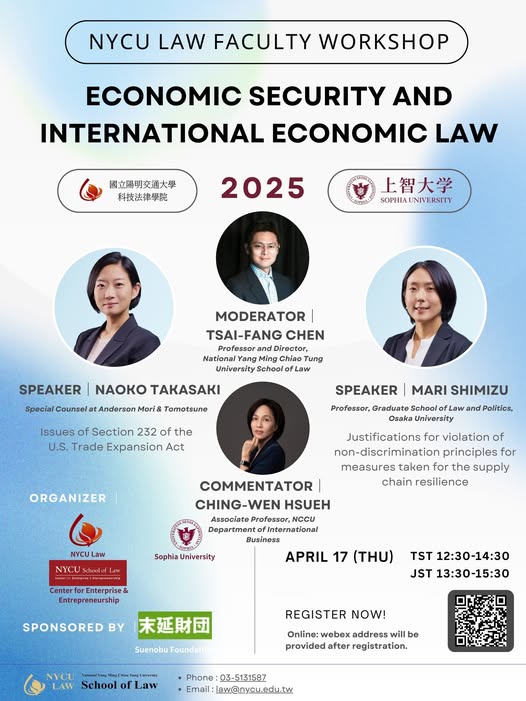國立陽明交通大學 x 上智大學第六場國際經濟法系列研討會——經濟安全與國際經濟法
我們於 2025 年 4 月 17 日圓滿舉辦第六場國際學術工作坊,本次線上研討會吸引超過 70 位與會者共襄盛舉,聚焦「經濟安全」如何重新定義國際貿易法與國安例外的法律界限。
感謝演講者及與談人以專業視角,帶領我們深入探討國家安全、供應鏈韌性與WTO法制間的交錯張力。
● 高嵜直子 特別法律顧問|Anderson Mori & Tomotsune
高嵜顧問介紹美國《1962年貿易擴展法》第232條的法律架構,並指出「國家安全」的適用範圍已從軍事延伸至經濟復興目標,如重建美國製造業。在QA時她特別強調半導體、藥品等§232關稅措施可能屬於「不可協商」(non-negotiable)的領域,與川普所採取的「對等關稅」可能屬於可談判的領域形成對比。
● 清水茉莉 教授|大阪大學法學政治學研究所
清水教授從WTO法的角度分析供應鏈韌性如何被納入正當化理由,歸納出四種WTO例外條款的適用方式,並強調若缺乏迫切性與具體風險,將形成制度性漏洞。同時清水教授也呼籲必須劃清「韌性」與「保護主義」之界線。
● 薛景文 副教授|國立政治大學國際經營與貿易學系
薛教授援引 Kadi 案例,認為國內憲政機制可能成為制衡恣意貿易措施的最後防線。
本場活動由 陳在方教授兼所長(國立陽明交通大學科技法律學院)主持。
特別感謝 川瀨剛志教授 與 岩田太教授 的支持與協助。
—————————————————————————
6th NYCU × Sophia University International Economic Law Workshop — Economic Security & International Economic Law
On April 17, 2025, we successfully held the sixth session of our international academic workshop series. This virtual event gathered over 70 participants and focused on how economic security is redefining the legal boundaries of international trade law and national security exceptions.
We are deeply grateful to our speakers and panelists for offering expert insights into the complex intersections of national security, supply chain resilience, and WTO law.
● Naoko Takasaki, Special Counsel|Anderson Mori & Tomotsune
Takasaki-sensei provided a legal overview of Section 232 of the U.S. Trade Expansion Act of 1962. She explained how the scope of “national security” has extended from military defense to broader economic revival goals, such as rebuilding domestic manufacturing. She particularly emphasized that §232 measures on sectors like semiconductors and pharmaceuticals may be regarded as “non-negotiable,” in contrast to typical “reciprocal tariffs” that may be open to negotiation.
● Professor Mari Shimizu|Osaka University, Graduate School of Law and Politics
Professor Shimizu analyzed how supply chain resilience has been incorporated as a justification under WTO law. She outlined four categories of WTO exceptions that may apply and emphasized that, in the absence of urgency and concrete risks, such justifications could create institutional loopholes. She also stressed the importance of clearly distinguishing between “resilience” and “protectionism.”
● Associate Professor Ching-Wen Hsueh|National Chengchi University, Department of International Business
Professor Hsueh cited the Kadi case, arguing that domestic constitutional mechanisms may serve as the final safeguard against arbitrary trade measures.
This session was moderated by Professor Tsai-fang Chen (Professor and Director, National Yang Ming Chiao Tung University School of Law).
We sincerely thank Professors Tsuyoshi Kawase and Futoshi Iwata for their support and collaboration.

